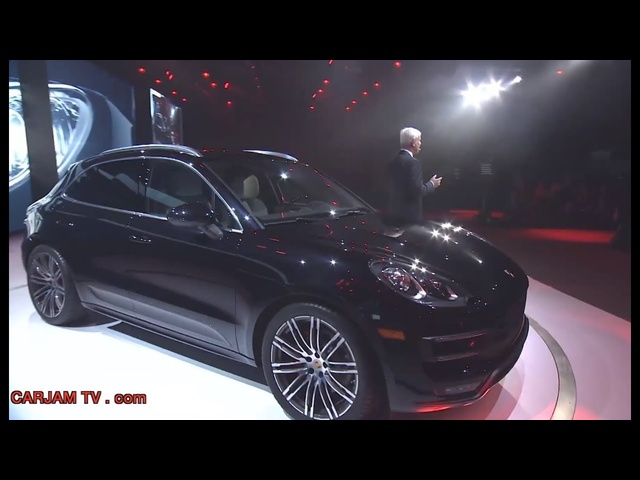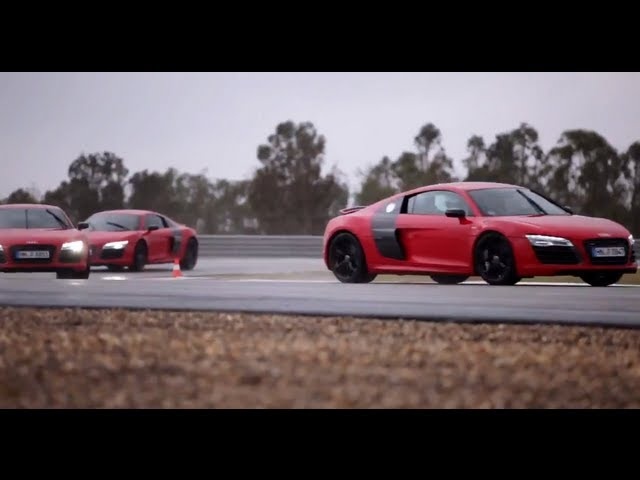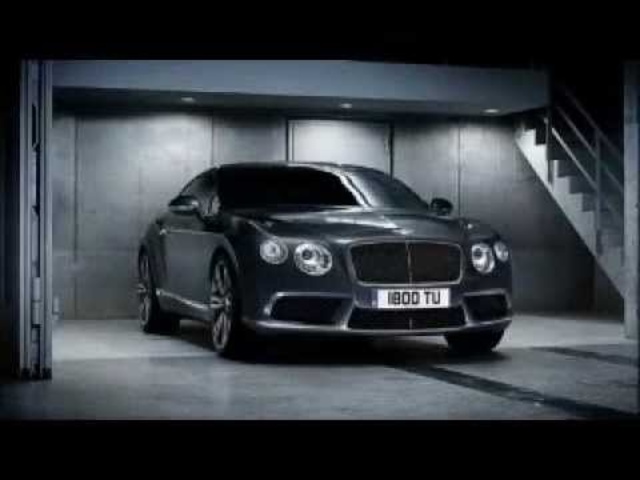Views: 17821
2014 BMW 530d Touring HD Driving F11 Commercial Carjam TV HD
CARJAM TV - Subscribe Here Now http://www.youtube.com/carjamradio
Like Us Now On Facebook: http://www.facebook.com/CarjamTV
For The World's Best Car Videos
Website: http://www.carjam.tv
The sixth generation of the BMW 5 Series the (F10) debuted 23 November 2009 as a 2010 model.[7] The Station Wagon/Touring version carries the chassis code F11. This chassis is shared with the 7 Series (F01) and the 6 Series (F12).
BMW 5 Series Changes include:
Introduction of four-cylinder turbocharged petrol engines with twin-scroll turbocharging, VALVETRONIC
New Sedan models include BMW 520d EfficientDynamics Edition, BMW 528i xDrive, BMW 525d xDrive, BMW 535d xDrive.
New Touring Models include BMW 528i xDrive, BMW 535i xDrive, BMW 525d xDrive, and BMW 535d xDrive.
Driving Experience Control becomes standard on BMW 5 Series Sedan and the BMW 5 Series Touring. On all four- and six-cylinder models, this switch also allows the driver to select ECO PRO mode.
Auto Start-Stop function as standard
New optional equipment include BMW ConnectedDrive (including the new-generation BMW Head-Up Display, Real-Time Traffic Information and hands-free opening of the tailgate or rear window)
From 2013, BMW 520d and BMW 520d EfficientDynamics Edition can also be ordered with BMW BluePerformance Technology which includes additional NOx catalyst storage for EU6 emission standard compliance.
Early Sedan models include 520d, 525d, 520d EfficientDynamics Edition, 520i, 528i. Early Touring models include 520d, 525d, 520i, 528i.
Beginning from spring 2013, the Comfort Package available for the BMW 5 Series Sedan and BMW 5 Series Touring will include automatic climate control with extended features, Park Distance Control (PDC), seat heating and lumbar support for driver and front passenger, automatically dimming rear-view mirror, the ambient light option and the HiFi loudspeaker system.
The F07 platform of the 5 Series GT provides a vehicle length traditionally found in a BMW 7 Series, but with the headroom found in the BMW X5 crossover SUV. The F07 also features a unique "bi-modal" trunk, similar to the Twin Door concept on the Škoda Superb, which may be opened in a traditional car-like fashion, or the entire hatch may be open in a traditional SUV fashion for larger objects.[13] Autoblog has suggested that similar vehicles include the Mercedes-Benz R-Class and the Lincoln MKT.[14] Edmunds Insideline has suggested that BMW has designed the 5 Series GT as "sedan-style utility" while the BMW X6 fastback crossover SUV (released the year before, in 2008 as a 2009 model) was meant as a "coupe-style utility".
The BMW 5 Series GT is roughly US$3,000 more than the equivalent BMW 5 Series sedan, being priced comparably to a similarly equipped BMW X5 midsize crossover SUV, and significantly less expensive than the BMW 7 Series. The 5 Series Gran Turismo, despite being badged as part of the midsize 5 Series lineup, has been described by Edmunds Insideline as a "7 Series Hatchback in Reality". This is as the GT's 120.7-inch (3,070 mm) wheelbase, 63.4-inch (1,610 mm) front track and 65.1-inch (1,650 mm) rear track are shared with the full-size short wheelbase 7 Series (F01), giving the GT considerably larger dimensions than the 5 Series (F10).[9][16] Indeed, the F07 5 Series GT shares design cues with that of the F01 7 Series; notably the shape of the headlights flanking a larger split-kidney grille, as well as its rear "L"-shaped taillights with a chrome reflector strip. The 2010 BMW 550i GT weighs in at 4,938 pounds (2,240 kg), which is 400 pounds (180 kg) heavier than the 2009 BMW 750i, and consequently the 550i GT's driving dynamics suffer compared to the 2009 BMW 750i and 2009 BMW X6 xDrive50i, despite sharing the same 4.4 L biturbo V8 engine.[14]
The F07 Gran Turismo shares the same F01 7 Series-derived platform, powertrain, mechanical package, and dashboard with the upcoming F10 5 Series. However, their front fascia has different headlights and bumper air intakes, while their taillights also differ. The F07 also has a taller height, resulting in a higher center of gravity, its longer length allows for more rear legroom, the rear passenger accommodation has optional "Executive" bucket seats for two instead of the three-seat bench, and it weighs 400 pounds (180 kg) heavier compared to the F10. The F07 also features frame-less doors and a double-pane liftgate trunk.
The F10/F11/F07 is the sixth-generation 5-Series, produced from 2009-present. The platform is based on the F01 7 Series.
The interior marks the return of the centre console being clearly angled towards the driver, another marked change from its immediate predecessor which was noted for its non traditional BMW design.
The F10 BMW M5 uses the S63 twin-turbocharged V8 engine and is the first M3 or M5 to use forced induction. https://en.wikipedia.org/wiki/BMW_5_Series
Like Us Now On Facebook: http://www.facebook.com/CarjamTV
For The World's Best Car Videos
Website: http://www.carjam.tv
The sixth generation of the BMW 5 Series the (F10) debuted 23 November 2009 as a 2010 model.[7] The Station Wagon/Touring version carries the chassis code F11. This chassis is shared with the 7 Series (F01) and the 6 Series (F12).
BMW 5 Series Changes include:
Introduction of four-cylinder turbocharged petrol engines with twin-scroll turbocharging, VALVETRONIC
New Sedan models include BMW 520d EfficientDynamics Edition, BMW 528i xDrive, BMW 525d xDrive, BMW 535d xDrive.
New Touring Models include BMW 528i xDrive, BMW 535i xDrive, BMW 525d xDrive, and BMW 535d xDrive.
Driving Experience Control becomes standard on BMW 5 Series Sedan and the BMW 5 Series Touring. On all four- and six-cylinder models, this switch also allows the driver to select ECO PRO mode.
Auto Start-Stop function as standard
New optional equipment include BMW ConnectedDrive (including the new-generation BMW Head-Up Display, Real-Time Traffic Information and hands-free opening of the tailgate or rear window)
From 2013, BMW 520d and BMW 520d EfficientDynamics Edition can also be ordered with BMW BluePerformance Technology which includes additional NOx catalyst storage for EU6 emission standard compliance.
Early Sedan models include 520d, 525d, 520d EfficientDynamics Edition, 520i, 528i. Early Touring models include 520d, 525d, 520i, 528i.
Beginning from spring 2013, the Comfort Package available for the BMW 5 Series Sedan and BMW 5 Series Touring will include automatic climate control with extended features, Park Distance Control (PDC), seat heating and lumbar support for driver and front passenger, automatically dimming rear-view mirror, the ambient light option and the HiFi loudspeaker system.
The F07 platform of the 5 Series GT provides a vehicle length traditionally found in a BMW 7 Series, but with the headroom found in the BMW X5 crossover SUV. The F07 also features a unique "bi-modal" trunk, similar to the Twin Door concept on the Škoda Superb, which may be opened in a traditional car-like fashion, or the entire hatch may be open in a traditional SUV fashion for larger objects.[13] Autoblog has suggested that similar vehicles include the Mercedes-Benz R-Class and the Lincoln MKT.[14] Edmunds Insideline has suggested that BMW has designed the 5 Series GT as "sedan-style utility" while the BMW X6 fastback crossover SUV (released the year before, in 2008 as a 2009 model) was meant as a "coupe-style utility".
The BMW 5 Series GT is roughly US$3,000 more than the equivalent BMW 5 Series sedan, being priced comparably to a similarly equipped BMW X5 midsize crossover SUV, and significantly less expensive than the BMW 7 Series. The 5 Series Gran Turismo, despite being badged as part of the midsize 5 Series lineup, has been described by Edmunds Insideline as a "7 Series Hatchback in Reality". This is as the GT's 120.7-inch (3,070 mm) wheelbase, 63.4-inch (1,610 mm) front track and 65.1-inch (1,650 mm) rear track are shared with the full-size short wheelbase 7 Series (F01), giving the GT considerably larger dimensions than the 5 Series (F10).[9][16] Indeed, the F07 5 Series GT shares design cues with that of the F01 7 Series; notably the shape of the headlights flanking a larger split-kidney grille, as well as its rear "L"-shaped taillights with a chrome reflector strip. The 2010 BMW 550i GT weighs in at 4,938 pounds (2,240 kg), which is 400 pounds (180 kg) heavier than the 2009 BMW 750i, and consequently the 550i GT's driving dynamics suffer compared to the 2009 BMW 750i and 2009 BMW X6 xDrive50i, despite sharing the same 4.4 L biturbo V8 engine.[14]
The F07 Gran Turismo shares the same F01 7 Series-derived platform, powertrain, mechanical package, and dashboard with the upcoming F10 5 Series. However, their front fascia has different headlights and bumper air intakes, while their taillights also differ. The F07 also has a taller height, resulting in a higher center of gravity, its longer length allows for more rear legroom, the rear passenger accommodation has optional "Executive" bucket seats for two instead of the three-seat bench, and it weighs 400 pounds (180 kg) heavier compared to the F10. The F07 also features frame-less doors and a double-pane liftgate trunk.
The F10/F11/F07 is the sixth-generation 5-Series, produced from 2009-present. The platform is based on the F01 7 Series.
The interior marks the return of the centre console being clearly angled towards the driver, another marked change from its immediate predecessor which was noted for its non traditional BMW design.
The F10 BMW M5 uses the S63 twin-turbocharged V8 engine and is the first M3 or M5 to use forced induction. https://en.wikipedia.org/wiki/BMW_5_Series
Make: BMW
More by CARJAM TV
-
 Porsche Macan Turbo / S / Diesel HD 2014 Part 2/2 ...
Porsche Macan Turbo / S / Diesel HD 2014 Part 2/2 ...
 Porsche
Views: 42937
Porsche
Views: 42937 -
 Audi R8 V10 Plus Speed Drivers Day 2013 ...
Audi R8 V10 Plus Speed Drivers Day 2013 ...
 Audi
Views: 2634
Audi
Views: 2634 -
 New Bentley GT V8 Continental Commercial 2013 ...
New Bentley GT V8 Continental Commercial 2013 ...
 Bentley
Views: 14570
Bentley
Views: 14570 -
 Maserati Ghibli 5 Star NCAP Crash Test Amazing ...
Maserati Ghibli 5 Star NCAP Crash Test Amazing ...
 Maserati
Views: 14182
Maserati
Views: 14182





